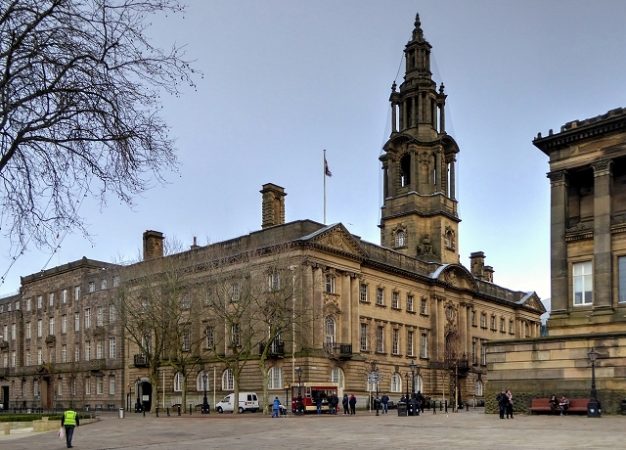The county council cited the pressures of the Covid-19 pandemic as its reason for withdrawing £22m to support the submission of a “first-of-a-kind”, county-wide bid for the title.
“We have carefully considered the potential costs and benefits of the bid and decided that Lancashire County Council can no longer underwrite it,” said Alan Vincent, council deputy leader and cabinet member for finance, in a statement on Wednesday afternoon.
“While the proposal was strong and ambitious, we felt that underwriting the bid to the tune of up to £22m created too great a financial risk to the council at a time when there are significant pressures on services and our costs, and continuing financial uncertainty following the pandemic.
“We know this will be disappointing to those who have worked so hard on this project over the past couple of years, but feel it is the right decision. Lancashire County Council remains committed to an ongoing programme of arts and culture, which is good both for the county’s residents and local economy.”
In particular, the council aims to “adopt elements from the proposal as it develops a new culture and sport strategy in the coming months and years”, Vincent added.
Umbrella organisation Lancashire 2025 was set up four years ago to oversee the bid to win the Government’s coveted UK City of Culture accolade, currently held by Hull.
The organisation comprises the county council, Lancashire Enterprise Partnership and the University of Central Lancashire (UCLan), and the bid preparation was being overseen in partnership with Blackburn with Darwen Borough Council, Blackpool Council, Lancaster City Council and Preston City Council, with support from other local authorities as well as arts and business bodies such as Creative Lancashire, Digital Lancashire and Marketing Lancashire. It has an independent chair and board.
The group was working to a 19 July expressions of interest deadline set by the Department for Culture, Media and Sport and had begun pulling together the key elements of the final bid it planned to submit by next March.
The vision was to compile a county-scale cultural programme to compete for the title – the first time this would have been done, Lancashire 2025 claimed – envisaging the county as a single ‘virtual city’ whose urban, coast and countryside areas were interconnected.
Announcing the intention to run for the title in 2019, bid director Debbi Lander said: “The bid will embrace different cultural personalities; the urban, coastal, countryside, industrial, historical and technological, all constellations of the shifting epicentre of our imagined, virtual city.
“Future cities should not be constrained by historic or geographic boundaries. Digital technology and connectivity has enabled the creation of new places or spaces more so than urban centres.”
The programme was proposed to include 100 creative projects from 100 locations and four neighbourhoods of what was termed the ‘Lancashire 2025 Virtual City’. Scoping work had been undertaken by cultural expert Andrew Dixon to explore the bid’s potential.
It is not clear how much money had been invested in preparing the formal expression of interest to the Government, and both Lancashire 2025 and the county council declined to reveal figures when contacted by Place North West.
Tony Attard, chair of Lancashire 2025, said in a statement: “It is with deep and great sadness that I have to announce that Lancashire will not be submitting a bid for UK City of Culture 2025.
“Unfortunately, the new administration at Lancashire County Council has taken the unilateral decision to withdraw their support for the bid, and without them acting as the accountable body the bid is simply untenable.
“The idea for Lancashire to become City of Culture 2025 is one that has matured over a four-year period…A significant amount of work has been undertaken by the many people involved, including talented people from the private sector. We have undertaken research and liaison with DCMS at a very high level, to create a compelling, innovative and original bid.”
“Bidding for City of Culture is a competitive process because the rewards for winning are so significant,” he added. “Lancashire has five of the most deprived areas in the UK within its boundaries, and we have been hit harder than most places by Covid 19, the people of Lancashire should not be denied these rewards.
“We had a very strong chance of winning this prestigious title – we have put in the work and created the partnerships that put us ahead of the competition. That we are being forced to pull out now, just three weeks before we were due to submit our formal expression of interest, is devastating.”
Phillippa Williamson was voted in as the new leader of Lancashire County Council in May after the ruling Conservative party retained control at the last local elections. She defeated Chorley Rural West representative Keith Iddon, who had been deputy leader of the council for the previous two years.
Deputy leader Vincent said of the council’s priorities for arts and culture: “We are continuing to work towards sustainable and reinvigorated offers for our museums and we are fully committed to cultural services across Lancashire.
“We will also continue to invest in our libraries and support innovative schemes such as the Re-imagining the Harris project in Preston [a £10m redevelopment of the grade one-listed museum, gallery and library in Preston’s Market Square].”

